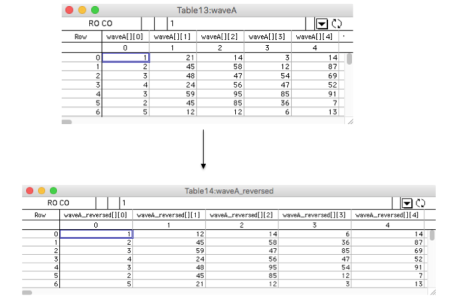
how to reverse values of every other column in a big matrix wave ?
Hello forum,
I want to reverse values of every other column in waveA, a matrix with 298 columns and 200 rows. Something like in attached image
I know for a single wave, I can use reverse command or use sort /R, but for 298x200 matrix and doing it manually for each column takes forever. So I was wondering if there is an easy way to solve this problem?
Thank you for your help.


Forum

Support

Gallery
Igor Pro 10
Learn More
Igor XOP Toolkit
Learn More
Igor NIDAQ Tools MX
Learn More







Here is a quick solution based on 200 rows, i.e. p goes from 0 to 199.
Duplicate oldwave, newwave
NewWave = mod(q,2)? oldwave[199-p][q] : oldwave[p][q]
Logic: checks to see if column is odd, modulus=1. and then reverses the row assignment. If even, modulus = 0, then just copies.
Andy
April 22, 2019 at 04:32 pm - Permalink
Here is a less-quick solution:
April 22, 2019 at 04:46 pm - Permalink
In reply to Here is a quick solution… by hegedus
this is cool thanks, what does "?" mark in command mean?
April 23, 2019 at 10:10 am - Permalink
In reply to Here is a less-quick… by JimProuty
Really cool , thanks a lot
April 23, 2019 at 10:10 am - Permalink
In reply to this is cool thanks, what… by Amo
From manual
? :
? : is the conditional operator, which is a shorthand form of an if-else-endif statement. It is of the form:
<expression> ? <TRUE> : <FALSE>
When expression is nonzero, it evaluates the TRUE part, otherwise it evaluates the FALSE part. The ":" character in the conditional operator must always be separated with spaces from the two adjacent operands. The operands must be numeric; for strings, you must use the SelectString function.
See Operators for a list of all operators in order of precedence.
Examples
Replace zero values with blanks:
Wave w = wave0
w = w[p]==0 ? NaN : w[p]
Andy
April 23, 2019 at 10:20 am - Permalink
Here is a more-quick solution:
April 25, 2019 at 05:02 am - Permalink
Wow, Steve- you're getting to be almost as creative with MatrixOP as AG is!
April 25, 2019 at 09:17 am - Permalink
Thanks, John. I am but Grasshopper at the feet of the Master :)
Sometimes the effort of Parsing MatrixOP pays off. For the (200 row, 298 col) case cited above, the point-index method gives Profiling result for 1000 iterations:
and identically-looped MatrixOP method gives
April 25, 2019 at 10:06 am - Permalink
In reply to Thanks, John. I am but… by s.r.chinn
Try adding the MultiThread keyword in front of the wave assignment statement in RevOddColsP. Depending on your processor, you might find that to be faster than the MatrixOP version. I did, with a 4 core/8 thread processor.
April 25, 2019 at 11:24 am - Permalink
This would be my approach. I used redimension to separate odd and even columns. I didn't check the speed.
April 25, 2019 at 12:16 pm - Permalink
gives
So it basically depends how many cores which solution is the best. Here I'm having 12.
April 25, 2019 at 02:25 pm - Permalink
In reply to This would be my approach. I… by olelytken
A quick test on my 10-year-old computer gives 0.00014 seconds
April 25, 2019 at 11:29 pm - Permalink
Just to close the loop with Adam's suggesting using MultiThread (in my 4-core cpu), 1000 iterations (divide times by 1000)
and with a more efficient MatrixOp modification
Your mileage may vary (with number of cores, matrix dimensions, etc.)
April 30, 2019 at 03:21 am - Permalink